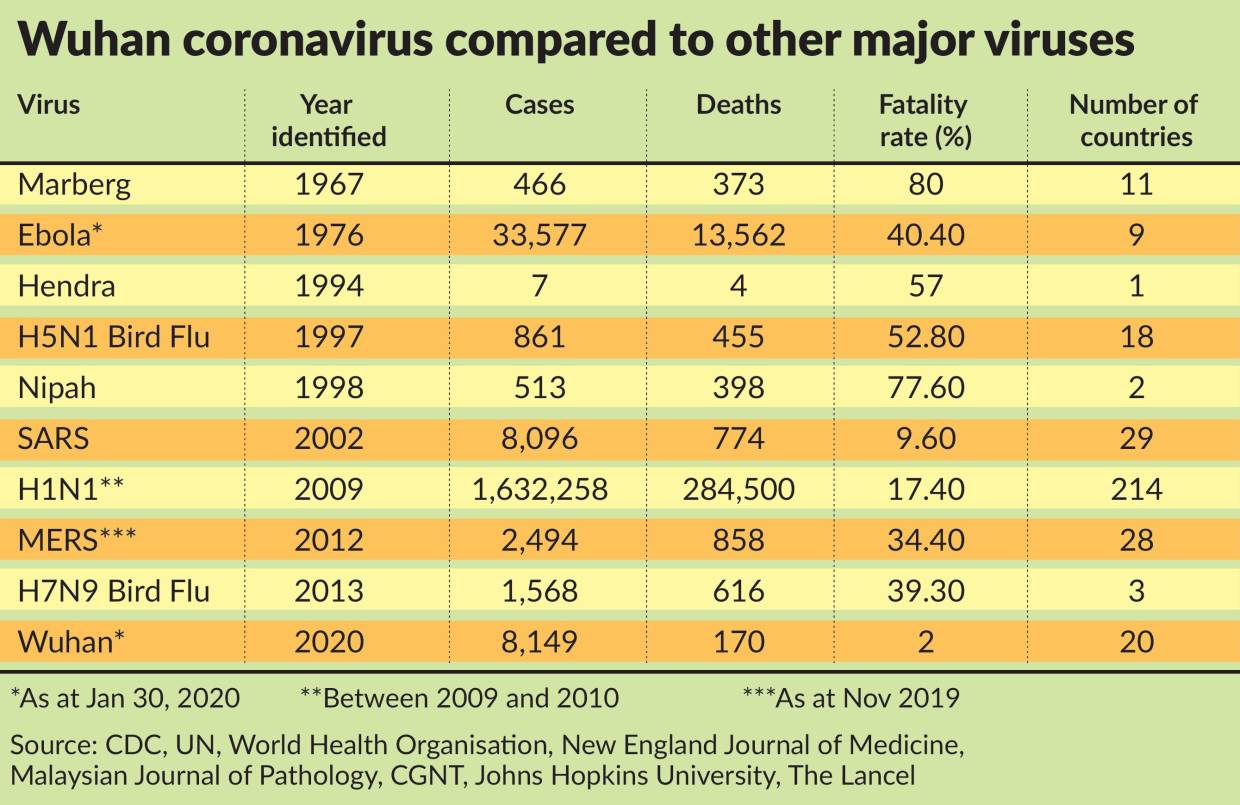
Proliferation of a contagious disease still falls behind the speed at which its prejudice spreads.
IT looks like it has become a new norm in Malaysia since the outbreak of the contagious coronavirus in China and around the world, with increasing numbers of confirmed cases including fatalities.
I attended church service last week, like I do on most Sundays, where I always extend my hand to greet church members but recently, I was surprised when someone refused to return the gesture.
He didn’t explain why but offered me the Salam Malaysia greeting, of his hand on the chest. For a moment, I thought Visit Malaysia 2020 was in full swing in my church.
But I soon got the message. My pastor later went up to the pulpit and reminded his congregation not to be offended if touching hands had to be temporarily stopped with the spectre of the virus looming large.
That’s not all! Banks have been sending me notices of their annual Chinese New Year open houses being postponed. And there I thought banks were still doing better than other businesses.
A relative from Singapore cancelled her trip to Kuala Lumpur because of the virus. I was about to grumble about the debilitating Singapore attitude of “kiasi” (the Hokkien word for fear of death or being overly concerned) until I realised she had good reason, being over 80 years old.
But I am finding it harder to fathom wearing face masks in Malaysia. Kuala Lumpur isn’t exactly a crowded city compared to Hong Kong, Seoul, Tokyo and many major cities in China.
There is hardly any physical contact, and even in the MRT it’s not packed like sardines in a sweaty, claustrophobic situation with strangers pressed against each other.
I would be very worried if placed in such proximity but I haven’t experienced such situations in our MRT, not even during peak hours.
So, the idea of wearing face masks isn’t in place yet. Besides, I have no reason to be protesting anything or concealing my identity for fear of been recognised by the law. I am in KL, and not HK.
Also, Malaysia is so humid and hot that everything gets burnt under the sun. We have warm weather all year round, unlike China which is cold now.
So, it was only apt for Deputy Health Minister Dr Lee Boon Chye to remind Malaysians that people without symptoms of the virus need not be afraid of going maskless in public places.
“If they do not have symptoms, they do not have to wear the masks for protection. It is not necessarily effective against infection.
“To avoid infection, what is most important is to wash the hands often, using soap and detergent.
“If a mask is not worn properly, there is also a risk of getting flu-like symptoms, ” he said recently.
But if you have a fever, cold or cough, it’s your responsibility to wear one to contain your illness, even if it’s just the common cold. No one is taking chances at this point.
Certainly, I would want to put on my face mask when I am travelling on a plane because I don’t know the passengers or where they have been. Besides, most of us, the proletariats, travel economy class, or the cattle class, where there could be some form of body contact, even if minimal.
That said though, I think the world has become unreasonably paranoid. Many of us are over-reacting to the virus. If you are a mainland Chinese, it’s a bad time to travel because you would be eyed with suspicion and prejudice, with many forgetting that China is a country with 1.2 billion people.
If you are an ethnic Chinese, possibly a Malaysian or Singaporean, you could also face the same discrimination.
A Malaysian tour operator texted me from Lebanon over the Chinese New Year holiday saying he felt he was being viewed contemptuously because of his appearance, given the news of the virus.
We have read of Chinese being kicked out of hotels and restaurants for being China nationals.
Malaysians are still driving cars and food deliverers are still beating traffic lights every second.
No surprise then that road fatalities in Malaysia number over 6,000 and more than 25,000 injuries have been recorded the past five years straight.
Malaysia has the third highest fatality rate from road traffic accidents in Asia and Asean, behind Thailand and Vietnam.
By comparison, the fatality rates in developed countries are all in single digits.
Transport accidents (5.4%) were the fourth most common cause of death in Malaysia in 2016, behind ischaemic heart disease (13.2%), pneumonia (12.5%) and cerebrovascular disease (6.9%). It was the third most common cause of death among men, behind ischaemic heart disease.
Basically, more Malaysians could die on our roads than from this virus, but thankfully, the worst has yet to happen.
In fact, when the H1N1 influenza epidemic broke out in 2009, hundreds of thousands perished worldwide, according to the Lancet Infectious Diseases Online report.
It said the global estimates were more than 15 times higher than the number of laboratory-confirmed deaths reported to the World Health Organisation.
In the case of Ebola, there were a reported 11,310 deaths in Guinea, Liberia and Sierra Leone but the fear was not felt because Africa is a distance away and these countries are not regarded international financial centres.
As the world grapples with the fear of the coronavirus, where even a sneeze from the common cold can trigger undue panic, can we retain some common sense? Can’t we?





